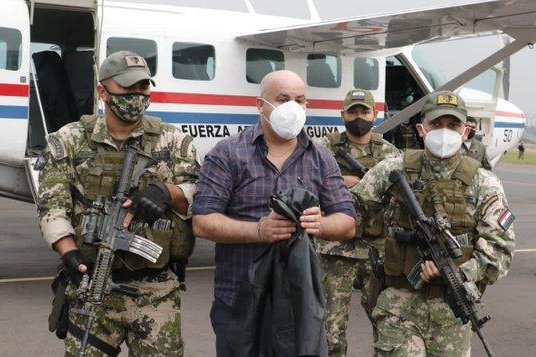CRIMINAL CAPITALI$M
U.S. sanctions Paraguayan money laundering networkOn Tuesday morning, Paraguayan authorities arrested Kassem Mohamad Hijazi on charges of laundering drug trafficking money.

Paraguayan authorities Tuesday morning arrested Kassem Mohamad Hijazi as the United States sanctioned him over perpetrating corruption. Photo courtesy of SENAD Paraguay/Twitter
Aug. 25 (UPI) -- Amid the Biden administration's crackdown on corruption worldwide, the Treasury sanctioned a money laundering network operating in the tri-boarder area of Argentina, Brazil and Paraguay.
The federal department sanctioned Kassem Mohamad Hijazi and two of his partners, Khalil Ahmad Hijazi and Liz Paola Doldan Gonzalez, along with five of their companies for their involvement in the scheme to launder hundreds of millions of dollars obtained through illicit means through the complex but vulnerable bureaucracies of the three nations' financial systems.
Kassem, 48, was identified by the Treasury as the leader of the money laundering organization based in Ciudad del Este, Paraguay. The department said he has worked from at least 2017 as a despachante who navigate the expensive, expansive and lengthy governmental process to import and export goods.
The Treasury accused Kassem of maintaining "strong ties" with Paraguayan politicians, police officers, district attorneys and money exchange brokers to provide him with assurances and security to operate his businesses in the tri-boarder area, which is known to contain a large number of unregistered money exchange houses that launder money through export-import and retail electronic and automotive businesses.
Kassem, a Brazilian of Lebanese descent, uses Espana Informatica S.A., which was one of the five businesses sanctioned Tuesday as it's run by the 60-year-old Khalil, to coordinate with American and Chinese suppliers to import U.S. electronic equipment into Paraguay through companies and other despachantes to avoid taxation and to launder money.
"Kassem coordinated with a company located in Florida for shipments of goods, for which he altered invoices and submitted them to a Paraguayan bank for a wire transfer payment back to the Florida-based company," the Treasury said. "The altered invoice greatly reduced the stated value of the goods shipped to avoid taxation and allowed Kassem to further launder the profits of his import/export operations."
The value of the goods was estimated in the hundreds of millions of dollars.
Paraguay's National Anti-Drug Secretariat announced authorities arrested Kassem Tuesday morning in Ciudad del Este from where he was transferred by the Paraguayan Air Force to the capital Asuncion.
In a statement, the SENAD said he has been charged with money laundering drug proceeds and was wanted by the U.S. Justice Department.
Kassem "would skillfully permeate the weaknesses of the national and international financial system to place and stratify funds from illicit activities including drug trafficking generating fraudulent commercial transactions," it said in a statement.
The SENAD called his arrest of "high strategic value for the United States and Paraguay."
It also said he and his brother, Chadi Mohamad Hijazi, were investigated and charged in 2004 with similar crimes, which were eventually dropped.
The investigation found he operated six money laundering houses in Ciudad del Este that moved millions of dollars of illicitly obtained funds.
The Treasury on Tuesday also sanctioned Doldan, 34, an associate of Kassem, and her company Mobile Zone International Import-Export S.R.L., which was used to purchase cell phones from a Miami-based company that were shipped to Paraguay as cheaper printers or printer toner.
The sanctions, which freeze all U.S. property and interests in property under their names while also barring U.S. citizens from doing business with them, comes after President Joe Biden named corruption as a target of his administration.
In early June, he issued a memorandum that said corruption was a threat to democracies and to U.S. national security while directing agencies to crack down on perpetrators with the Global Magnitsky Act.
In a statement Tuesday, the State Department said the actions taken by the administration represent a whole-of-government effort to combat corruption in the tri-boarder area.
"The United States is committed to supporting Paraguay's efforts to combat corruption and promote accountability for those who undermine government institutions," Secretary of State Antony Blinken said. "Corruption degrades the rule of law, weakens economies and stifles economic growth, undermines democratic institutions, perpetuates conflict, deprives innocent civilians of fundamental human rights and is intrinsically linked to money laundering and the lack of financial transparency."
No comments:
Post a Comment